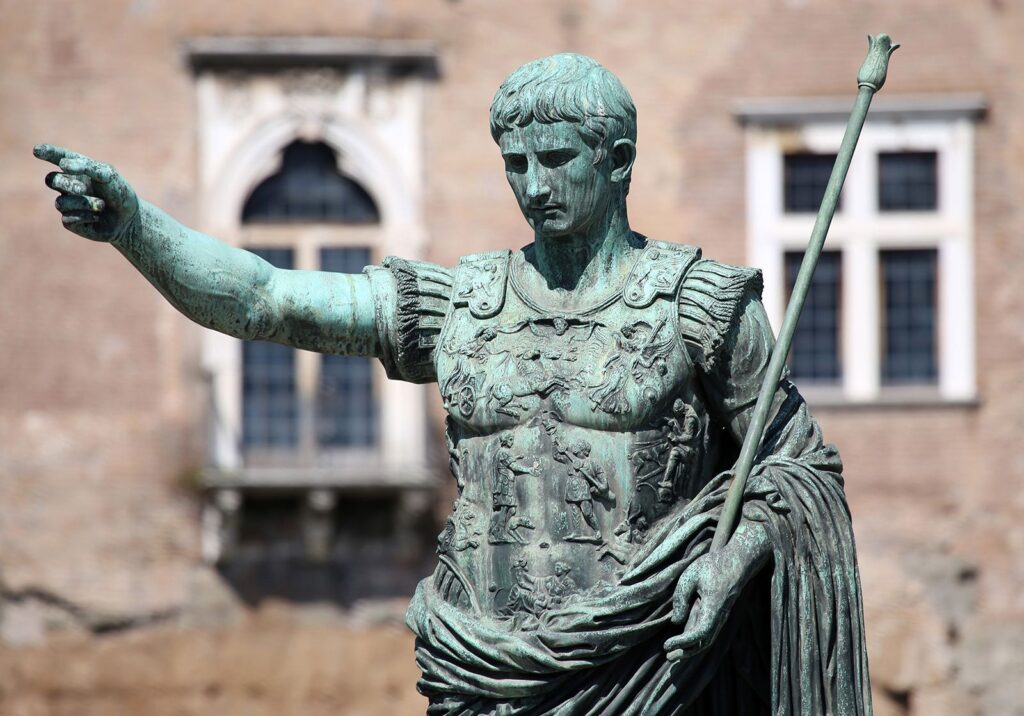
This is the first in a series of articles to reflect on Christian Nationalism. For more on this topic, you can read my book, Go and Do Likewise: Following Jesus into Our Common Humanity.
If you’re Christian: Take some time to think about your own faith tradition. How does it invite you to respect, build relationships, and partner with people from other wisdom traditions and cultures?
If you’re part of another wisdom tradition: Consider the complex and intense conversation happening within Christianity right now.
As the first century began, a new religion emerged: Worship of Caesar.
This isn’t a new story. Powerful leaders often claim they’re different, better, or chosen by the gods to control people. In ancient Rome, the empire spread a story that Augustus Caesar was the son of the god Apollo. Caesar and his successors said they were doing the gods’ will, and anyone who questioned them faced punishment from the Roman army and the anger of the gods.
They claimed both divine right of kings and the wrath of the divine if you dissented.
Caesar also took money from everyday people. Every fish caught in the Sea of Galilee was taxed. Every time it was processed or shipped, it was taxed again. Caesar and his wealthy friends kept a share of all this money. They provided little in the way of services in return. In reality, the Caesars ran things like the mafia, backed by an army.
This kind of system is called a “patrimonial” system. In these systems, wealth flows upward to the wealthy and powerful. Limited benefits flow downward from those in charge to everyone else. People’s worth is decided by how close they are to power and how well they follow the rules set by the powerful.
Patrimonial systems work by dividing people. Leaders constantly pit groups against each other and encourage fear. Different groups are targeted and dehumanized one at a time. People who aren’t targeted at that moment often join in to avoid becoming targets themselves. This keeps everyone afraid and powerless, forcing many to conform just to survive.
Rome enforced this fear through violence and death, calling it the “Peace of Rome.” Crucifixion was used by Rome to terrify people, killing thousands each year. Jesus was one of many who died this way. For early Christians, Jesus’ resurrection meant that the Empire’s violence didn’t have the final word. Instead, it encouraged courage and hope for a world free from this cruelty and oppression.
Today, I’m deeply concerned—but sadly not surprised—that some Christians picture Jesus more like Caesar, supporting a world similar to the Roman Empire instead of the inclusive and compassionate “Kindom of God” Jesus spoke of. Christian Nationalism today often promotes this same kind of patrimonial system—exactly the type of system that put Jesus on the cross.
Most Christians don’t support Christian Nationalism. But its supporters, backed by social media and wealthy groups, often have the loudest voice. Occasionally, other voices break through—like Bishop Budde recently, or Pope Francis. Here is a link to the National Council of Churches’ statement on Christian Nationalism.
Over the next several weeks, I’ll explore different parts of Christian Nationalism and share ways that people of all traditions can respond. The key strategy isn’t just learning about Christian Nationalism or having a clear message against it. The most important thing we can do is gather with groups from diverse traditions, cultures, and identities to build friendships, work together, and enjoy each other’s company.
When we do, even those drawn to Christian Nationalism may start asking, “Why are you hanging out with them?” Those familiar with Jesus’ story might recognize he was asked the same question.
